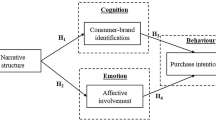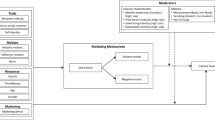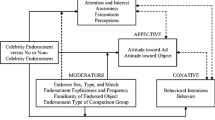Abstract
In 1949 Culliton noted that “… religion has something to offer business” (Culliton, 1949, p. 265). While religion definitely does have something to offer business, especially business ethics, it is only recently that empirical research linking religiosity and business ethics has been conducted. Indeed, religiosity affords a background, against which the ethical nature of business, including marketing and consumer behavior, can be interpreted. This article offers a descriptive, rather than normative, perspective in reviewing articles linking religion to business and consumer ethics. The main objective of the article being both to present some of the most significant empirical findings to date and also to encourage researchers to pursue further research in this relatively under researched area.
Similar content being viewed by others
References
Ahmed, M., Chung, K.Y., and Eichenseher, J.W., (2003), “Business Students’ Perception of Ethics and Moral Judgment: A Cross-Cultural Study,” Journal of Business Ethics, Vol. 43, No. 1 &2, 89-102.
Allport, G. W. (1950), The Individual and His Religion, New York: MacMillan.
Allport, G. W. and J. M. Ross (1967), “Personal Religious Orientation and Prejudice,” Journal of Personality and Social Psychology, Vol. 5, 447-457.
Aquino, Karl and Americus Reed II (2002), “The Self Importance of Moral Identity,” Journal of Personality and Social Psychology, 83 (6), 1423-1440.
Barnett, T., Bass, K., and Brown, G., (1996), “Religiosity, Ethical Ideology, and Intentions to Report a Peer’s Wrongdoing,” Journal of Business Ethics, 15, No. 11, 1161-1174.
Batson C.D., (1976) Religion as Prosocial: Agent of Double Agent?”. Journal for the Scientific Study of Religion 15:29-45.
Batson, C.D., Schoenrade, P., and Ventis, W.L., (1993), “Religion and the Individual: A Social-Psychological Perspective,” Oxford, Oxford University.
Bergman Roger (2004) Identity as Motivation: Toward a Theory of the Moral Self. In: Lapsley D., Narvaez D. (eds) Moral Development, Self, and Identity. Mahwah, NJ: Erlbaum. pp. 21-46.
Bjarnason Dana (2007) Concept Analysis of Religiosity. Home Health Care Management and Practice 19 (5):350-355.
Clark James W., Lyndon E. Dawson (1996) Personal Religiousness and Ethical Judgments: An Empirical Analysis. Journal of Business Ethics 15 (March):359-372.
Conroy, Stephen J. and Tisha L. N. Emerson (2004), “Business Ethics and Religion: Religiosity as a Predictor of Ethical Awareness among Students,” Journal of Business Ethics, 50 (April I), 383-396.
Cottone, J., Drucker, P., and Javier, R.A., (2007), “Predictors of Moral Reasoning: Components of Executive Functioning and Aspects of Religiosity,” Journal for the Scientific Study of Religion, Vol. 46, No. 1, 37-53.
Culliton, J.W., (1949), “Business and Religion,” Harvard Business Review, Vol. 27, No. 3, 265-271.
Donahue, M.J., (1985), “Intrinsic and Extrinsic Religiousness: Review and Meta-Analysis,” Journal of Personality and Social Psychology, Vol. 48, 400-419.
Duriez, Bart and Bart Soenens (2006), “Religiosity, Moral Values and Moral Competence: A Critical Investigation of the Religiosity-Morality Relation,” International Journal of Behavioral Development, 30 (1), 76-83.
Emmons, R.A., (1999), “Striving for the Sacred: Personal Goals, Life Meaning, and Religion,” Journal of Social Issues, 64, No. 5, 731-745.
Epstein, E.E., (2002), “Religion and Business – The Critical Role of Religious Traditions in Management Education,” Journal of Business Ethics, Vol. 38, 91-96.
Ferrell, O.C. and Larry G. Gresham (1986), “A Contingency Framework for Understanding Ethical decision Making in Marketing,” Journal of Marketing, Vol. 49, 87-96.
Forsyth, Donelson R. (1980), “A Taxonomy of Ethical Ideologies,” Journal of Personality and Social Psychology, 39 (1), 175-184.
Geyer, Anne L., Roy F. Baumeister (2005) Religion, Morality, and Self-Control. In: Raymond F. Paloutzian and Crystal L. Park (eds) The Handbook of Religion and Spirituality. The Guilford Press, New York, pp. 412-432.
Glover, R. J. (1997), “Relationships in Moral Reasoning and Religion among Members of Conservative, Moderate, and Liberal Religious Groups,” The Journal of Social Psychology, 137, 247-254.
Hegarty, W. Harvey and Henry P. Sims Jr. (1978), “Some Determinants of Unethical Decision Behavior: An Experiment,” Journal of Applied Psychology, 63 (August):451-457.
Hegarty, W. Harvey and Henry P. Sims Jr. (1979), “Organizational Philosophy, Policies, and Objectives Related to Unethical Decision Behavior: A Laboratory Experiment,” Journal of Applied Psychology, 64 (June): 331-338.
Hill, Peter C. and Ralph W. Hood, Jr. (1999), Measures of Religiosity, Birmingham, Alabama: Religious Education Press.
Hunt, Shelby D. and Scott J. Vitell (1986), “A General Theory of Marketing Ethics,” Journal of Macromarketing, 8 (Spring), 5-16.
Hunt, Shelby D. and Scott J. Vitell (1993) The General Theory of Marketing Ethics: A Retrospective and Revision. In: N. Craig Smith and John A. Quelch (eds) Ethics in Marketing. Homewood, IL, Irwin Inc., 775-784.
Jones, Thomas M. (1991), “Ethical Decision-Making By Individuals In Organizations: An Issue-Contingent Model,” Journal of Management Review, 16, 366-395.
Kennedy E.J., and Lawton, L. (1998), “The effects of social and moral integration on ethical standards: A comparison of American and Ukrainian business students,” Journal of Business Ethics, Vol. 15, No. 8, 163-175.
Kidwell, J.M., Stevens, R.E., and Bethke, A.L., (1986), “Differences in Ethical Perceptions Between Male and Female Managers: Myth or Reality?” Journal of Business Ethics, Vol. 6, 489-493.
Kohlberg, Lawrence (1981), The Meaning and Measurement of Moral Development, Worcester, Massachusetts: Clark University Press.
Kurpis, L., Beqiri, M., and Helgeson, J. (2008), The Effects of Commitment to Moral Self-improvement and Religiosity on Ethics of Business Students, Journal of Business Ethics, Vol. 80, No. 3, 447-463.
Longenecker, J.G., McKinney, J.A. and Moore, C.W. (2004), Religious Intensity, Evangelical Christianity, and Business Ethics: An Empirical Study, Journal of Business Ethics, Vol. 55, No. 4, 371-384.
Magill, G.: 1992, `Theology in Business Ethics: Appealing to the Religious Imagination', Journal of Business Ethics 11(2), 129–135.
McDaniel, S.W., and Burnett, J.J., (1990), “Consumer Religiosity and Retail Store Evaluative Criteria,” Journal of the Academy of Marketing Science, Vol. 18, No. 2, 101-112.
McNichols, C.W., and Zimmerer, T.W., (1985), “Situational ethics: An Empirical Study of Differentiators of Student Attitudes,” Journal of Business Ethics, Vol. 4, No. 3, 174-180.
Rawwas, Mohammed Y.A., Ziad Swaidan and Jamal Al-Khatib (2006), “Does religion Matter? A Comparison Study of the Ethical Beliefs of Marketing Students of Religious and Secular Universities in Japan,” Journal of Business Ethics, Vol. 65, No. 1, 69-86.
Salsman, J.M., Brown, T.L., Brechting, E.H., and Carlson, C.R., (2005), “The Link Between Religion and Spirituality and Psychological Adjustment: The Mediating Role of Optimism and Social Support,” Personality and Social Psychology Bulletin, 31(4):522-535.
Sapp, G. L. and S. T. Gladding (1989), “Correlates of Religious Orientation, Religiosity and Moral Judgment,” Counseling and Values, 33, 140-145.
Shepard, J.M., and Hartenian, L.S., (1990), “Egoistic and Ethical Orientations of University Students Toward Work-Related Decisions,” Journal of Business Ethics, Vol. 10, No. 4, 303-310.
Singhapakdi Anusorn, Janet K. Marta, Kumar Rallapalli and C. P. Rao (2000) Toward an Understanding of Religiousness and Marketing Ethics: An Empirical Study. Journal of Business Ethics 27 (October II), 305-319.
Singhapakdi, A., Salyachivin, S. Virakul, B. and Veerayangkur, V., (2000), “Some Important Factors Underlying Ethical Decision Making of Managers in Thailand,” Journal of Business Ethics, Vol. 27, No. 3, 271-284.
Singhapakdi, A., Vitell, S.J., and Franke, G.R., (1999), Antecedents, Consequences, and Mediating Effects of Perceived Moral Intensity and Personal Moral Philosophies, Journal of the Academy of Marketing Science, Vol. 27, No. 1, 19- 36.
Siu, N.Y.M, Dickinson, J.R., and Lee, B.Y.Y., (2000), “Ethical Evaluations of Business Activities and Personal Religiousness,” Teaching Business Ethics, Vol. 4, No. 3, 233-256.
Smith, T.B., McCullough M.E., and Poll, J., (2003), “Religiousness and Depression: Evidence for a Main Effect and the Moderating Influence of Stressful Life Events,” Psychological Bulletin 129(4):614-636.
Vitell, S. J., M. N. Bing, H. K. Davison, A. P. Ammeter, B. L. Garner and M. M. Novicivec: 2009, ‘Religiosity and Moral Identity: The Mediating Role of Self-Control’, Journal of Business Ethics 88(4), 601--613.
Vitell, Scott J. and Joseph G. P. Paolillo (2003), “Consumer Ethics: The Role of Religiosity,” Journal of Business Ethics, 46 (August II), 151-162.
Vitell, Scott J., Joseph G. P. Paolillo and Jatinder Singh (2005), “Religiosity and Consumer Ethics,” Journal of Business Ethics, 57 (March II), 175-181.
Vitell, Scott J., Joseph G. P. Paolillo and Jatinder Singh (2006), “The Role of Money and Religiosity in Determining Consumers’ Ethical Beliefs,” Journal of Business Ethics, 64 (March II), 117-124.
Vitell, Scott J., Jatinder Singh and Joseph G. P. Paolillo (2007), “Consumers’ Ethical Beliefs: The Roles of Money, Religiosity and Attitude toward Business,” Journal of Business Ethics, 73, 369-379.
Walker, L. J. and R. C. Pitts: 1998, ‘Naturalistic Conceptions of Moral Maturity’, Development Psychology 34, 403--419.
Weaver, J.R., Agle, B., (2002), “Religiosity and Ethical Behavior in Organizations: A Symbolic Interactionist Perspective,” Academy of Management Review, Vol. 27, No. 1, 77-97.
Wilkes, R.E., Burnett, J.J., and Howell, R.D., (1986), “On the Meaning and Measurement of Religiosity in Consumer Research,” Journal of the Academy of Marketing Science, Vol. 14, No. 1, 47-56.
Wulff, D. M. (1991), Psychology of Religion: Classic and Contemporary Views, New York: Wiley.
Author information
Authors and Affiliations
Corresponding author
Rights and permissions
About this article
Cite this article
Vitell, S.J. The Role of Religiosity in Business and Consumer Ethics: A Review of the Literature. J Bus Ethics 90 (Suppl 2), 155–167 (2009). https://doi.org/10.1007/s10551-010-0382-8
Published:
Issue Date:
DOI: https://doi.org/10.1007/s10551-010-0382-8




